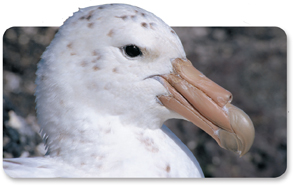Adaptations to Extreme Environments The kidneys of most terrestrial vertebrates are remarkable organs, but the way they operate results in some limitations. Most vertebrate kidneys, for example, cannot excrete concentrated salt. That's why most vertebrates cannot survive by drinking seawater. All that extra salt would overwhelm the kidneys, and the animal would die of dehydration. Some marine reptiles and birds, such as the petrel in Figure 27–17, have evolved specialized glands in their heads that excrete very concentrated salt solutions. Another remarkable excretory adaptation is found in the kangaroo rats of the American southwest. The kidneys of these desert rodents produce urine that is 25 times more concentrated than their blood! In addition, their intestines are so good at absorbing water that their feces are almost dry.

FIGURE 27–17 Excretion Adaptations Some terrestrial animals that spend a large amount of time in salt water, such as this petrel, have special adaptations to rid themselves of excess salt. This bird, which hunts for fish in the ocean, has special glands in its nostrils that separate salt from the water it swallows and excrete the salt as a thick, sticky fluid.
27.4 Assessment

-
Review Why does the metabolic waste ammonia pose a problem for all animals?
Explain How do insects, reptiles, and birds eliminate ammonia? How do mammals and some amphibians eliminate it?
Apply Concepts How do kidneys help maintain homeostasis while processing nitrogenous wastes?
-
Review In general, how do aquatic animals address the ammonia problem?
Compare and Contrast How do the differing water balance needs of freshwater animals and saltwater animals explain the difference in their excretion of nitrogenous wastes?
-
Review In what form do (a) annelids and mollusks, (b) insects and arachnids, (c) mammals and land amphibians, and (d) reptiles and birds excrete nitrogenous wastes?
Relate Cause and Effect Explain how differing water balance needs relate to an animal's conversion of ammonia to either urea or uric acid.
BUILD VOCABULARY
The Greek word ouron, meaning “urine,” has led to the root uro-, of urea and uric (acid). Why is it appropriate that these two words are each formed from a root word meaning “urine”?

Table of Contents
- Formulas and Equations
- Applying Formulas and Equations
- Mean, Median, and Mode
- Estimation
- Using Measurements in Calculations
- Effects of Measurement Errors
- Accuracy
- Precision
- Comparing Accuracy and Precision
- Significant Figures
- Calculating With Significant Figures
- Scientific Notation
- Calculating With Scientific Notation
- Dimensional Analysis
- Applying Dimensional Analysis




